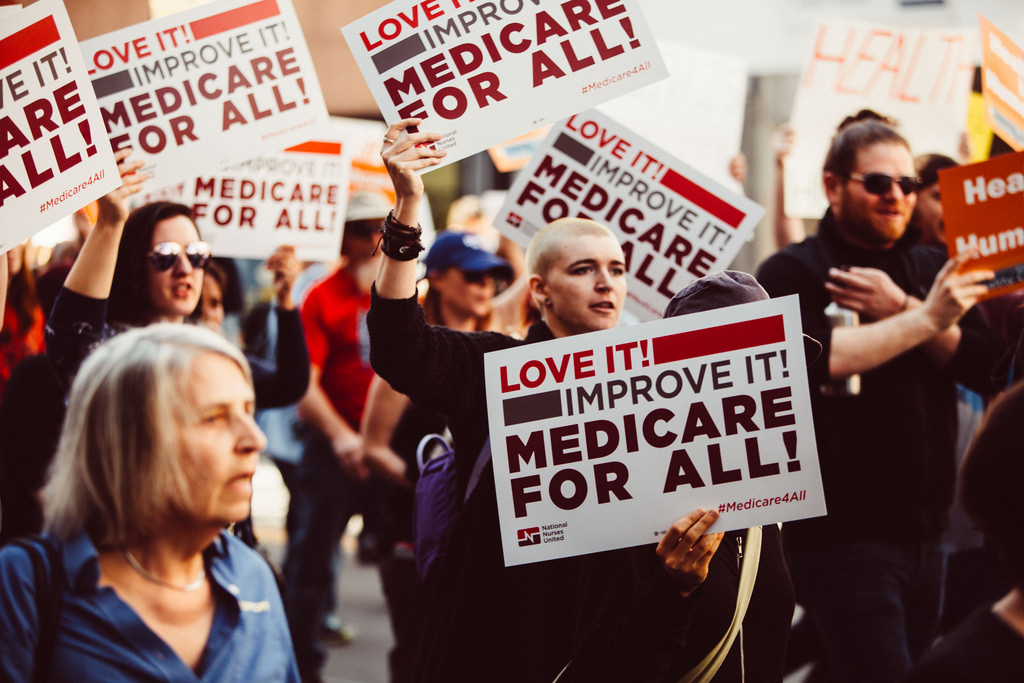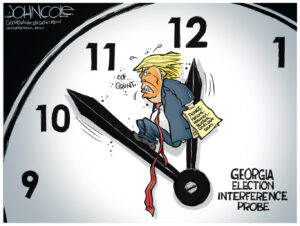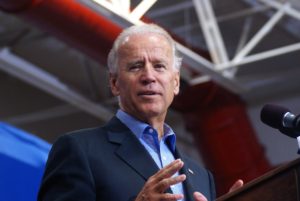Unions Dig In to Protect Hard-Fought Health Plans
Leaders are skeptical of Medicare for All proposals that don’t make room for their top-notch plans, affecting the Democratic policy debate. Medicare for All supporters take to the streets of Los Angeles during a June 2017 rally. (Molly Adams / Flickr)(CC BY 2.0)
Medicare for All supporters take to the streets of Los Angeles during a June 2017 rally. (Molly Adams / Flickr)(CC BY 2.0)
Deep under Los Angeles, laborers are busy digging more subway lines to connect a complex and diverse populace, with whom they have sometimes conflicting goals. While changing the city, union workers like those from Laborers Union Local 300 will also have much to do with rebuilding a health care system that is presently unfair, overpriced and cumbersome.
Local 300, with more than 8,000 members, is affiliated with the 100,000-member Los Angeles/Orange County Building Trades unions. Together, the unions are a considerable political force in Southern California. Union leaders, believing they have already negotiated better plans with employers, are skeptical about a government plan like Medicare for All that would eliminate their coverage. This attitude, not exclusive to unions, is influencing the health insurance debate and helping shape the Democratic presidential contest.
I visited Local 300 headquarters, located in a largely Latino working-class section of Los Angeles, recently because my notions of Medicare for All had been challenged by some Local 300 leaders.
I’ve long thought that the way to go for the United States was a system in which everyone would have a Medicare card, show it at a hospital, urgent care facility, pharmacy or doctor’s office and get care without deductibles, surprise charges, premiums or maddening denials of care. In other words, give everyone the care those over 65 receive from Medicare and millions more through the Affordable Care Act and Medicaid for low-income earners.
I brought this up at a luncheon where I happened to be seated with some Local 300 folks. One of them said he had good insurance and didn’t want to change. He gave me some examples of what is obviously a terrific plan.
I saw there was more to the story than I had thought. As with most political debate, the rhetoric just skimmed the surface.
Local 300’s members do work like construction, asbestos abatement, maintenance and a number of other tasks. The website of the local’s parent, Laborers’ International Union, said the average wage for a union laborer is $28.08 an hour, compared to $18.10 for nonunion workers.
The workers on the subway project, called miners, remove the muck and dirt left by machines actually digging the tunnels, run by the operating engineer members. The Laborers Union members also install the waterproofing and concrete and help build the subway stations.
I parked in the union headquarters’ underground garage and took the elevator up to the second floor. Local official Ernesto Panoja greeted me and brought me to a conference room where the union chief, business manager Sergio Rascon, awaited me.
We went over Local 300’s health plan. Rascon said Local 300 members have a choice of three plans, which start at $20 co-pays per visit. One is with Kaiser Permanente and another is an employee preferred option, in which recipients can pick a doctor or hospital that is in a network. The third is a preferred provider option, allowing recipients to go outside the network if they don’t mind a higher co-pay.
I told him it sounded like a good plan, more specific than what we’d heard from the Democratic candidates—and certainly better than President Donald Trump’s proposal, which would wipe out the Affordable Health Act, known as Obamacare.
Rascon made it clear that Local 300 wants to preserve its health care plan.
“I don’t have a problem with” Medicare for All, said Rascon, “providing our plans are left alone. Our plans have been going for decades. They do not cost the taxpayer a dollar.”
His words echoed those of Richard Trumka, who heads the AFL-CIO. Trumka told reporters earlier this year, “There’s no question that ultimately we need to establish a single-payer system, but there has to be a role for those hard, hard-fought, high-quality plans that we’ve negotiated.”
On another day, I talked on the phone to Kurt Petersen, co-president of Unite Here Local 11, which represents 32,000 workers at hotels, restaurants, airports, sports stadiums and convention centers. Like the Laborers Union, Unite Here offers a wide-ranging health care program. The main source of care is Kaiser, although union members can go to other physicians in a network. Participants pay a $10 co-pay. Generic prescriptions that Petersen said were “relatively affordable” are available. The union has its own dental clinic. “Our economic package counting health care pension is well over $35 an hour,” he said.
But to Petersen, that’s not the whole story. The local has spent a huge amount of time bargaining for these benefits. “We and other unions have struck, spent countless hours at [the] bargain table, countless hours. … It is ridiculous how much time and sacrifice we have put into it—energy, strikes, picket lines—to maintain our excellent health insurance,” he said. “There has to be a better way.”
“We want universal health care. It is a no-brainer,” he said. It would remove health care from the bargaining table. “If we remove that, we can organize around wages, pensions, work rules,” Petersen said, expressing a view counter to that of leaders of some other unions.
But chances of that happening are unlikely. Even if the Democrats win the White House and the Senate and retain control of the House, Medicare for All in all likelihood would be sunk by the same combination of insurance companies and medical business interests that have killed revolutionary reform for many decades.
In addition, as David Leonhardt wrote in The New York Times:
Many Americans are happy with their current insurance, polls show. Even among those who aren’t, many worry about being forced into a new plan. “Loss aversion is a hell of a drug,” notes Brendan Nyhan, a University of Michigan political scientist.
Facing such doubts about her ambitious Medicare For All plan, Sen. Elizabeth Warren threw a surprise into the contest for the Democratic presidential nomination when she scaled back her proposal.
Under her latest version, private insurance plans, such as those negotiated by the Laborers’ Local 300 union and Unite Here Local 11, would not be eliminated, at least in the first three years of a Warren presidency. Rather, Americans could use their private insurance or buy into current Medicare. That brings Warren into line with the proposals of former Vice President Joe Biden and several other candidates. The entire package would have the effect of improving the Affordable Care Act.
That’s a contrast to Sen. Bernie Sanders, the godfather of current Medicare For All plans. Under Sanders, private plans, either those negotiated by union and management or provided by nonunion companies, would disappear.
It’s important to note that Warren plans to do much to reduce the income inequality that plagues the country. She vows to repeal the Trump tax cuts and raise taxes on wealthy households and corporate profits. The proceeds would finance initiatives that would greatly improve American life. Among them are universal child care, increased spending on public schools, the canceling of student debt, free college, increased Social Security payments and combating climate change.
All that would help construction workers, asbestos removers, wait staff, bell attendants and many others who want to move up the economic ladder. And they could keep the health insurance they fought so hard to win.
Your support matters…Independent journalism is under threat and overshadowed by heavily funded mainstream media.
You can help level the playing field. Become a member.
Your tax-deductible contribution keeps us digging beneath the headlines to give you thought-provoking, investigative reporting and analysis that unearths what's really happening- without compromise.
Give today to support our courageous, independent journalists.








You need to be a supporter to comment.
There are currently no responses to this article.
Be the first to respond.